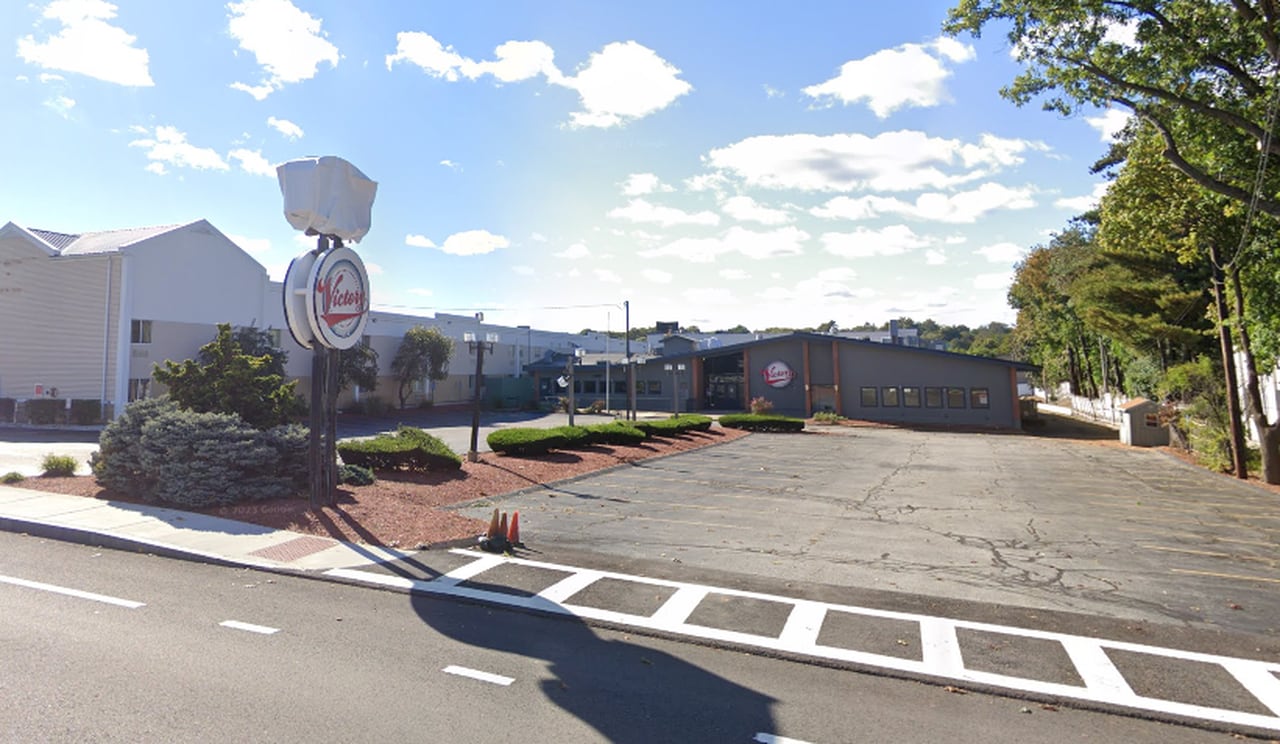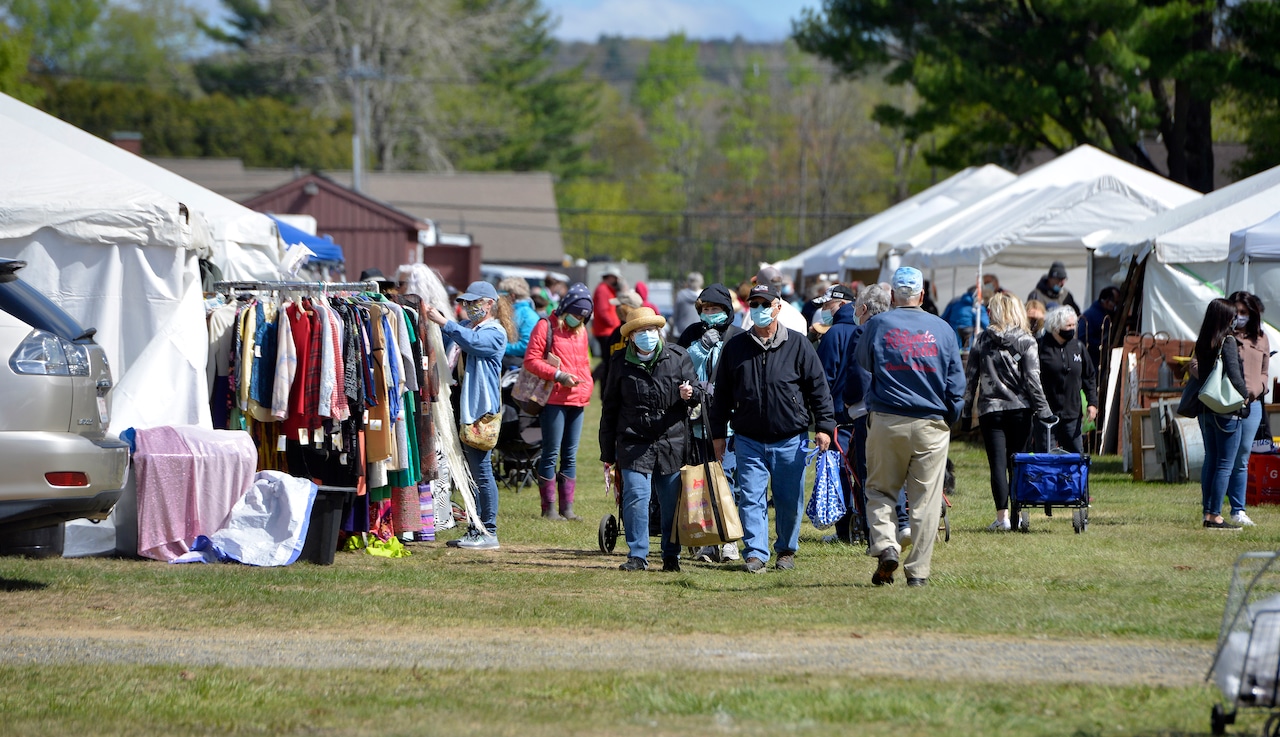
As the state continues struggling to meet the needs of both unhoused families at home and migrant families arriving in Massachusetts, the latest clash between those trying to help and those who think enough is enough was over a vacant restaurant building in Dedham.
At a Zoning Board of Appeals meeting on Wednesday, residents turned out both in opposition and support of a request to use the former Victory Grille on Elm Street as a hub for a catering operation to feed migrants staying at several hotels in the area. After more than an hour-and-a-half of at times confrontational discussion, the proposal was rejected by a 2-3 vote.
While the Dedham battle was unique in that it was over a food service operation, it is just one in a series of incidents of Massachusetts residents fighting back when the state places families in their towns as it seeks to spread the load.
“What’s going on right now in Massachusetts is not going to be solved by the cities. The suburbs to some extent have to assist,” said Mark DeJoie, CEO of Lynn-based Centerboard, one of the many organizations working with the state to provide emergency shelter. “We’ve met resistance from town officials that don’t think their city has a homeless problem, and therefore that they’re okay and they don’t need to participate.”
In August 2023, Gov. Maura Healey declared a state of emergency as more and more migrants arrived and Massachusetts’ shelter system was pushed beyond its limits. While the state guarantees a right to shelter for families with children, requiring it to house them, in October, Healey put a cap of 7,500 families on the shelter system, forcing any families beyond that number to be added to a waiting list.
As of Thursday, there were 7,545 families enrolled in the Emergency Assistance program’s shelters and hotels, according to state data.
Healey said in December that operating the emergency shelter system could cost $2 billion over the next two years.
In Dedham, Giri Hotel Management contracted with the state to house about 425 people at the Elm Street hotel. A representative of the company explained at Wednesday’s ZBA meeting that it had begun cooking meals for its residents at the Victory Grille building last week.
However, in response to a request for proposals from the state for contractors to provide food services, the company had hoped to begin providing catering to other hotel shelter locations.
Giri already operates eight other hotel properties that are acting as shelters, most of which do not have kitchen facilities.
Currently, a Giri property in Quincy is producing about 3,000 meals per day for most of these properties. And the Inn at Dedham could have taken some of that pressure off by cooking more meals to be transported by van.
In its permit application, Giri wrote that the Victory facility could produce about another 400 meals per day with four to six employees and two delivery vans. There would be no meals served on-site.
While the meeting was only to decide the fate of the catering proposal, much of the testimony from residents in opposition centered on resentment about the shelter’s presence in the first place.
While some worried about traffic from deliveries or the adequacy of dumpsters at the property, others voiced apprehension about stress on town resources, giving “handouts” to migrants, the imposition from the state and the use of taxpayer money.
“This is not about whether people in emergency housing should be fed. Let us first prioritize the long-term interests of Dedham,” resident Ed Dockham said. “Our public safety and school systems are at best stressed due to the emergency housing that has been thrust upon our town without forethought or financial backing, and without any plan on how and when the emergency housing will not be required.”
Some supporters, however, pointed out that the hotel was not what was at issue at the meeting. Resident Marisa Howard-Karp called arguments about the town’s tax base “irrelevant.”
“This is about actually feeding the people who are already living here,” she said. “We’re not losing out on hotel taxes because of what’s happening here right now. The decision that’s leading to the hotel tax issue, that’s already been made, and that’s out of the town’s hands.”
Beth Griffiths, who said she lives across the street from the facility, said she had received a flyer on her door telling her about the meeting, with what she called “racist language” against migrants of color.
“If it was 400 Ukrainian migrants being served at this facility, I can guarantee you this notice wouldn’t have been posted on my door,” she said, receiving jeers from others in the audience in response. “God help if Black people benefit from this and a small business benefits from this … because that’s what this is about.”
Other communities have also had recent controversies over shelters.
In Boston’s Roxbury neighborhood, a temporary shelter that opened in January at the Melnea Cass Recreation Complex initially met strong pushback from neighbors, who said it was taking away an important community hub from an already-burdened, majority-Black neighborhood.
In Quincy in September, a tense community meeting about a shelter in a dormitory at Eastern Nazarene College exhibited conflicting opinions from hundreds of residents just days after the neo-Nazi group NSC-131 held a demonstration in front of it, the Patriot Ledger reported at the time.
Some communities have been somewhat successful in stopping shelter locations from even opening. In October, state officials announced they would no longer seek to house families at Westfield State University after the school repeatedly refused to offer one of its dorm buildings.
In Yarmouth, intentions to place families at a motel led to a protest followed by a packed Board of Selectmen meeting. The state backed down after selectmen wrote a letter saying the motel had a history of zoning violations, but still placed families in another motel in town.
The arguments made by opponents are often the same across communities. DeJoie of Centerboard said while he has met incredible help and cooperation from some cities on the North Shore where his organization operates, the most common concerns he hears from others are about an influx of students to local schools and disruptions to neighbors.
At least the latter fear may be unfounded: over the last year-and-a-half, despite the large number of families Centerboard has supported, DeJoie could only recall two police calls to its properties, one of which was medical. But at the same time, he said he could understand why neighbors can be anxious.
“The unknown is scary,” he said.





